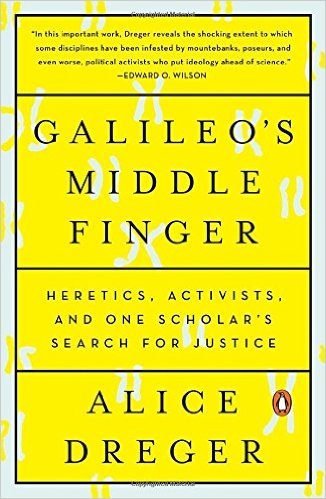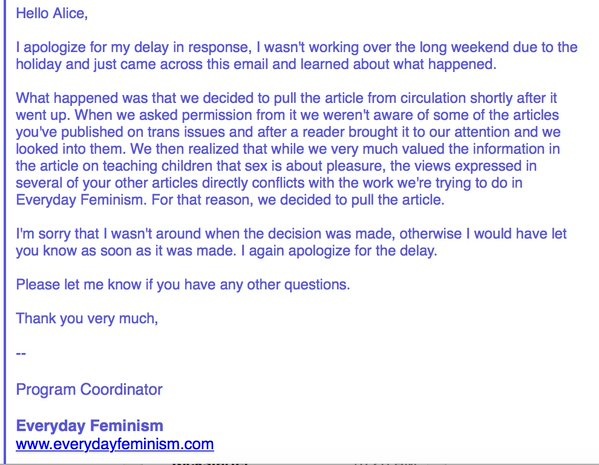|
Alice Dreger, who spent much of her career advocating for intersex rights, has been banned by Everyday Feminism for being "transphobic."
Last fall, I wrote The Orgasm Gap is Real – But Don’t Blame It On The Patriarchy, which quickly became my most popular post of that month. It was my response to a horrible, disempowering article I’d read on Feministing, regressive “feminist” website that pops up on my newsfeed sometimes.
The article, Here's What I would Have Said To You Last Night Had You Not Cum And Then Fallen Asleep, basically relieved women of any responsibility or agency over their sexual pleasure.
We fuck until you come, I do not come, you do not ask if I would like to come or if you can help make me come, and then we’re done fucking, because you have decided we are done fucking, and everyone is supposedly happy.
In other words: don't state your standards or expectations. Don't tell dudes what you want. Instead, rely on man's amazing ability to read your mind and know exactly how much foreplay you want and how to help you orgasm.
This is the opposite of feminism. Feminism is about empowering women and giving them agency. If you have expectations for your sexual interactions, you need to be a big girl and tell the guy! If you’re not getting what you want in bed, the only person you can possibly blame is yourself. Not the freaking patriarchy! (Honestly, if you’re not mature enough to talk about what you want sexually, you might not be mature enough to be having sex.) I was disappointed in Feministing for posting such garbage, and I was disappointed in Reina Gattuso, the author, for writing it. That said, I later read a Feministing article by the same author. In You Assaulted Me - Now Can You Please Call Me Back?, Gattuso poignantly captures the complicated emotions people feel after an assault – how, sometimes, after someone does something so disgustingly dehumanizing to you, all you really want is to feel human again. Perhaps by finding out it was all a misunderstanding. Perhaps through an apology. Perhaps by learning that the guy likes you as a person, and not just an unwilling sex object. Sexual assault is complicated, people! And I'm glad Gattuso wrote something that does such a great job of explaining why. But that's not that this article is about. This article is about how I can simultaneously hate one post on a certain website by a certain author… and love another one enough that I write an entire blog post about why everyone needs to read it. Because guess what? It is okay to agree with someone on some things, but not others. You don't have to hate, ban, censor and disinvite people who disagree with you sometimes. Sadly, this is a concept that seems to have gotten lost in the new social justice and feminism movements -- and that worries me. Rational thought, reasonable discussions and healthy skepticism are important, and the expectation of conformity of every view, past and present... it's unhealthy. Yet we are seeing more and more attempts by feminists to silence those who disagree with one or more far left regressive cause. Let’s take the example of Alice Dreger. Dreger is a former Northwestern professor of Clinical Medical Humanities and Bioethics at the Feinberg School of Medicine and author of several books, including Hermaphrodites and the Medical Invention of Sex, Galileo’s Middle Finger: Heretics, Activists, and One Scholar’s Search for Justice and Intersex in the Age of Ethics.
In addition to spending decades advocating for intersex rights, Dreger also published a wildly popular essay, What If We Admitted to Children That Sex is Primarily About Pleasure? in May 2014. (It was interesting, but I didn't 100% agree with it.)
Then, in 2016, the website Everyday Feminism contacted Dreger asking for permission to republish the essay. After discussing terms, the article went live on EF… for about a day. Dreger, surprised to discover the 404 error, contacted Josette Sousa, Program Coordinator for EF, and received this reply (eventually):
(Too busy to discuss the decision with Dreger, or even let her know a decision has been made – but not too busy to pull the article. Tacky.)
Dreger writes on her website that she has no idea what she could have possibly written to upset the trans community, and notes that EF didn’t tell her. She proceeds to link to several articles in which she supports trans- and intersex people. She has devoted a large part of her career to intersex activism. Meghan Murphy, founder of Feminist Current, speculates that Dreger’s alleged “transphobia” stems from a 2008 article she wrote in defense of sex researcher J. Michael Bailey, who presented a new theory on transexualism – one that resonated with some trans women, and sparked ire in others. (Huh. I guess not all trans people feel the exact same way about every issue. Imagine that.) For that, she was banned by Everyday Feminism. A lifetime of defending intersex people and writing progressive books and articles about sex education… and a few people who disagreed with one of her opinions got her redacted from an intersectional publication. In other words, today’s version of social justice allows no room for error – and it absolutely does not allow for intellectual disagreement. Even from people who are on the same side. I have also been banned by Everyday Feminism -- I had the audacity to ask for data to support a claim about "medical fat shaming". And I'm far from the only one -- I get comments and emails all the time from other feminists who are not allowed to interact with EF's content, all over small disagreements (usually ones in which the banned has either offered their personal experience as a counter-example, or asked for evidence to support a ridiculous-sounding claim). Granted, I have my own platform to express my voice. And when I share it on my own blog instead of on their social media, I make money off of it, which is always nice. See also:
But that doesn't mean EF is off the hook. They pretend to be some kind of scholarly publication, some kind of authority on feminism? Then they should be promoting autonomy and empowerment, not eroding self-reliance. They should encourage women to discuss their difference viewpoints, rather than all conform to the same set of ideas. Other examples of this: Grown women demanding "safe spaces" where they can watch videos of puppies, blow bubbles and play with play-doh when controversial speakers (like factual feminist Christina Hoff Sommers) come to their campus. Interrupting (and even assaulting) invited speakers from whom they actually could have learned something or strengthened/refined their own viewpoints. The removal of men's rights activist Deam Esmay's essays from the Huffington Post UK. And so many others. Seriously, just Google "feminist censorship" and you'll come up with more than you can read.
That said... in any of these cases, I'm sure there is more agreement than disagreement. I actually agree with most of EF's articles. I just can’t get behind their more sensational, ridiculous stuff -- e.g., assigning “sniffers” to smell people I invite to my party to make sure no one is wearing any fragrances; objecting to objectivity in debates; equating artificial insemination of cows to rape of actual women, etc.
So, once again, I am going to encourage everyone out there -- liberal or conservative, in agreement with me or not -- to keep an open mind. Hear people out. Be respectful. Learn from others -- diversity is important, right? And remember: ambivalence is perfectly okay. Reasonable people typically avoid thinking in absolutes, and are able to evaluate different topics individually.
5 Comments
Nate
7/23/2016 03:57:23 pm
Thank You. I recently attempted to post a comment on Feminist Current, only to have it disappear quickly. Discourse being important to any social change, I feel that the intolerance of dissenting opinions represents an active threat to the credibility of the third wave.
Reply
Lucia B.
7/23/2016 05:07:32 pm
To Everyday Feminists, disagreeing with their views on transgender people is far from a "little thing." According to them, common beliefs about trans people, including the idea of autogynephilia, are incredibly hurtful and ultimately lead to suicides and murders.
Reply
7/25/2016 03:42:11 pm
I can't possibly respect their "opinion" on that, because the facts say otherwise. There is more than one way to be trans, and plenty of people identify with Bailey's research and writing on autogynephilia.
Reply
CarobSteviaMatte
9/8/2016 09:30:41 am
OMG, the Trans-fascists... NOTE: I totally support trans rights (in most cases, at least), but their social media attack squadron is definitely among the worst. On the one hand, it is great that social media has empowered the fringe of society to have a voice. On the other hand, it is sometimes NOT so great that the fringe of society now has such a LOUD and bullying voice.
Reply
Leave a Reply. |
About the Author

Eva is a content specialist with a passion for play, travel... and a little bit of girl power. Read more >
Want to support The Happy Talent? CLICK HERE!
Or Find me on Patreon!
What's Popular on The Happy Talent:
Trending in Dating and Relationships:
What's Popular in Science: Playfulness and Leisure Skills:
Popular in Psychology and Social Skills:
Categories
All
|




























 RSS Feed
RSS Feed